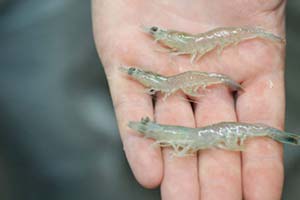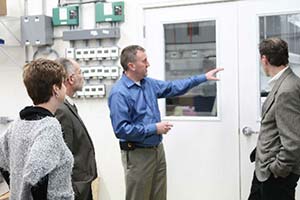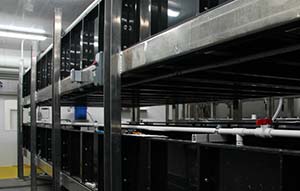Trū Shrimp, a unit of Ralco, and Schwan’s Company, a major frozen foods producer and marketer in the United States, have formed a strategic partnership to launch an in-land shrimp production enterprise in Minnesota. While specific terms of the deal were not announced, it was revealed that Schwan’s is making a significant investment in the project, which includes a $50 million indoor aquaculture facility in Luverne and a Litopenaeus vannamei white shrimp hatchery in Marshall.
The company will also renovate a vacant USDA-approved plant in Marshall with capacity to process more than 8,000,000 pounds of shrimp annually. In addition, a training facility will be built in Balaton, adjacent to the trū Shrimp Innovation Center and Laboratory.
 The grain belt locale of southwestern Minnesota is a long way from the major centers of shrimp farming in brackish water ponds and mangroves of tropical and subtropical Asia, Oceania and South America. But taking into account the environmental impact of traditional shrimp farming methods in some countries that is under increasing scrutiny by environmentalists and government regulators, trū Shrimp is betting that political and economic factors will loom larger in future aquaculture development decisions – especially now that technological advances may well increase the competitiveness of shrimp aquaculture in temperate climate zones around the world.
The grain belt locale of southwestern Minnesota is a long way from the major centers of shrimp farming in brackish water ponds and mangroves of tropical and subtropical Asia, Oceania and South America. But taking into account the environmental impact of traditional shrimp farming methods in some countries that is under increasing scrutiny by environmentalists and government regulators, trū Shrimp is betting that political and economic factors will loom larger in future aquaculture development decisions – especially now that technological advances may well increase the competitiveness of shrimp aquaculture in temperate climate zones around the world.
According to a posting at the company’s website: “Shrimp ponds displace massive amounts of water and leave the land unusable after it’s been expended. Ocean-caught shrimp has also been shown to negatively impact the surrounding ocean ecosystems. It’s reported that for one pound of shrimp there are 20 pounds of bycatch.”
 Trū Shrimp has scaled up super-intensive raceway systems developed by Dr. Addison Lawrence at Texas A&M University to offer a “breakthrough approach” to provide a consistent and traceable supply of shrimp to sustain growing demand, which in the USA alone has increased more than three fold in the past 35 years. Patented Tidal Basin technology employs a highly advanced system that facilitates indoor shrimp raising in shallow water. An apex tank is utilized to mimic natural ocean currents, focusing on reducing stress in an environment where shrimp can thrive.
Trū Shrimp has scaled up super-intensive raceway systems developed by Dr. Addison Lawrence at Texas A&M University to offer a “breakthrough approach” to provide a consistent and traceable supply of shrimp to sustain growing demand, which in the USA alone has increased more than three fold in the past 35 years. Patented Tidal Basin technology employs a highly advanced system that facilitates indoor shrimp raising in shallow water. An apex tank is utilized to mimic natural ocean currents, focusing on reducing stress in an environment where shrimp can thrive.
The stackable Tidal Basin innovation maximizes output while reducing the amount of space needed in a grow-out facility. The design allows for waste to be continually removed, and feed to be evenly distributed. Advanced water management enhances recycling and lessens volume requirements. Furthermore, proper aeration for shrimp is provided on a continual basis.
Animal nutrition is a key part of maintaining water habitat and ensuring strong, healthy shrimp. Drawing from years of experience in nutrition at Ralco, state-of-the-art feeding systems have been developed.
 Tidal Basins create a controlled habitat where environmental conditions are monitored and adjusted for optimal health and safety. All shrimp can be traced throughout the production process, and bio-security practices assure consumers that the shellfish they eat have been raised with utmost care.
Tidal Basins create a controlled habitat where environmental conditions are monitored and adjusted for optimal health and safety. All shrimp can be traced throughout the production process, and bio-security practices assure consumers that the shellfish they eat have been raised with utmost care.
“We have been watching with great interest the concept and the progress being made by trū Shrimp,” said Schwan’s CEO Dimitrios Smyrnios. “We are intrigued and excited about the possibilities of in-land shrimp production and view this as an excellent opportunity to provide consumers with a predictable and traceable supply of nutritious shrimp.”
Large-scale Business on Horizon
Groundbreaking for the shrimp production facility is scheduled for early 2018. Trū Shrimp Managing Director Michael Ziebell said construction in both Marshall and Luverne are major steps toward developing a large-scale shrimp aquaculture industry in the region.
“What is happening in Minnesota has not been done anywhere in the world. We are creating an industry that will supply safe, clean and abundant shrimp,” stated Ziebell. “There are 1.6 billion pounds of shrimp consumed annually in the United States, and 80% of it is imported – largely from Asia. The facilities in Marshall and Luverne will produce the most natural shrimp possible using a sustainable, antibiotic-free and environmentally responsible approach.”
He continued, “We are often asked: ‘Why raise shrimp in Minnesota?’ The answer is because the feed is here. Economically and environmentally, it makes much more sense to raise shrimp near their food source than to ship feed to shrimp raised in coastal ponds thousands of miles from the US market. Previously, the technology to effectively raise shrimp in the midwestern United States on a large scale did not exist. Now it does, and we have proven it.”
An economic impact study conducted by the University of Minnesota concluded that construction and operation of shrimp production and packing facilities in Marshall and Luverne would provide a major economic boost to the region. The study projects the initial phase would generate over $48 million in economic contribution. Construction of the bio-secure facility would result in $14.5 million of labor income and support an estimated 330 jobs. Once the nine-acre structure is built, it should continue to generate an estimated $23 million annually in economic activity and provide employment directly and indirectly for 124 people.
“It’s also going to benefit the larger rural community,” said Luverne Mayor Pat Baustian. “The shrimp are fed primarily soybeans, corn and hard red wheat, which positively affects the bottom line of every farmer in Minnesota. When our farmers do well, the whole region does well.”
“We are eager to be a part of this strategic relationship with Schwan’s,” said Ralco President and CEO Brian Knochenmus. “It is a proven company that brings great market insight and capabilities to assist the growth and development of trū Shrimp. Schwan’s recognizes the potential of what we are doing, and the impact it will have not only domestically, but also internationally.”
About the Companies
 Trū Shrimp is an affiliate of family-owned Ralco, a third-generation animal feeds supplier with distribution in more than 20 countries. It provides products to large segments of the livestock, poultry, aquaculture and crop industries.
Trū Shrimp is an affiliate of family-owned Ralco, a third-generation animal feeds supplier with distribution in more than 20 countries. It provides products to large segments of the livestock, poultry, aquaculture and crop industries.
Schwan’s Company is a privately held family-owned business that manufactures and markets frozen foods through home-delivery, retail grocery and foodservice channels. Among its brands are Red Baron, Tony’s, Bon Appétit and Freschetta pizza, Mrs. Smith’s and Edwards desserts, and Pagoda snacks.





